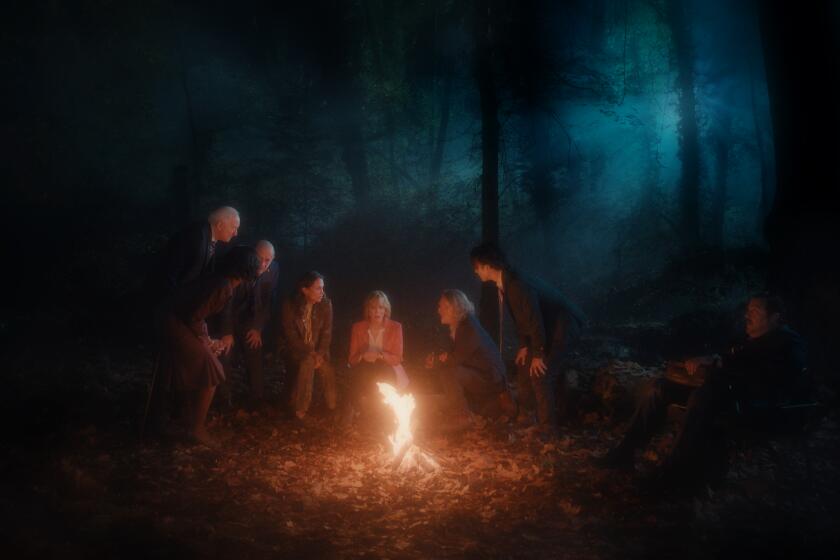On A&E;, It’s ‘Schwarzkopf’ Lite
The sound track is right out of Francis Ford Coppola’s bizarre big movie about Vietnam: swells of Wagner’s “Ride of the Valkyries” crescendo from the screen, as in “Apocalypse Now.”
Only this time it’s not napalm-loving Robert Duvall and his fleet of choppers coming into view on the crest of the blaring music. It’s someone else, someone who for most Americans now symbolizes the destruction of evil and the triumph of good.
Apocalypse Norm.
The Persian Gulf War has been available in capsulized video form for some time now, ranging from accounts by CNN and Britain’s Independent Television News to ABC’s “Schwarzkopf: How I Won the War.” The latter consists of the Operation Desert Storm commander’s entire postwar briefing, which was so popular and widely praised that the cassette quickly sold out at many video stores.
Now cable’s Arts & Entertainment network weighs in at 5 and again at 9 tonight with “Schwarzkopf,” the latest in its long-running series of hourlong “Biography” programs. The subject is, of course, Gen. H. Norman Schwarzkopf, a figure arguably more hyperbolic than historic--and the adoring treatment given him here fits the nation’s worshipful mood.
A never-wavering, all-knowing Schwarzkopf, we’re told, “was convinced that this time the United States was in the right place fighting the right war.”
This is television’s first stab at a comprehensive profile of this four-star general, who owes his present celebrity solely to the Persian Gulf crisis. Thus, “Schwarzkopf” is not a typical “Biography,” most of whose subjects--ranging this spring from Babe Ruth to Adolf Hitler--have been time-tested as epic figures of history, whether for better or for worse.
Schwarzkopf, on the other hand, is an instant hero and giant-come-lately, and the thinness of this hastily fused-together program affirms it. This is a time for grinding out quickie histories and crowding onto bandwagons.
As it turns out, A & E’s “Schwarzkopf” is not even homemade. It’s an American adaptation of Independent Television News’ “General H. Norman Schwarzkopf: Command Performance” video.
“Biography” has stamped on its own signature by having its host, Peter Graves, do the intro, close and commercial segues from Norton Air Force Base in San Bernardino. But the footage and script are virtually identical to ITN’s video, the only differences being that an American narrator now mouths the words instead of an Englishman, and that “Biography” has attached a brief postwar addendum updating Schwarzkopf and the tragedy of Iraq’s Kurds.
Although Schwarzkopf is now having his moment in history, it remains to be seen how long that moment will last. Yet this hour on “the life and military genius” of Schwarzkopf is of the moment, awarding him a fifth star while delivering a message as blunt and incisive as the general himself: He’s a flawless icon.
From the West Point Schwarzkopf to the Vietnam Schwarzkopf to the Desert Storm Schwarzkopf, nothing here appears to be new, as the program supports its ample generic file footage with the general’s comments during his televised Gulf briefings and previous television interviews.
Old news pictures show Viet Cong preparing booby traps. Narrator: “These incidents colored Schwarzkopf’s reactions to questions about mines during Desert Storm.” Cut to Schwarzkopf at a press briefing: “Ever been in a mine field?”
What you get here primarily is a history of the Gulf War, because beyond the war and his quips, there doesn’t seem to be much of a history of Schwarzkopf to tell. Thus, padding is required. For example, the effort to place Schwarzkopf beside history’s great military leaders seems premature at best, but it does help fill out the hour: That legendary Carthaginian Hannibal’s victory over the Romans more than 2,000 years ago is taught at West Point. Schwarzkopf attended West Point. Thus, we get a mini-lesson on Hannibal.
Schwarzkopf’s one glaring political blemish--his controversial statement to TV interviewer David Frost that he had wanted to “continue the march” and wage a “battle of annihilation” against Saddam Hussein’s forces but was overruled by President Bush--is fleetingly noted here, then flicked away.
After being publicly contradicted by Bush and Defense Secretary Dick Cheney, Schwarzkopf made a U-turn by withdrawing his statement and apologizing to the President for his “poor choice of words.”
The narrator about Schwarzkopf’s behavior here: “His diplomatic skills worked skillfully.”
What does that mean? That Schwarzkopf, as many suspect, did differ with his bosses over sealing off and destroying the Iraqi army, but chose to wriggle out of this public-relations dilemma? This is an important point, given the size of the military machine that did remain at Iraq’s disposal to crush the postwar Kurdish rebellion.
In choosing not to pursue this, “Biography” confirms that its own diplomatic skills are working as skillfully as Schwarzkopf’s. And as skillfully as Iraqi TV’s when it makes flattering biographies of Saddam Hussein.
More to Read
Only good movies
Get the Indie Focus newsletter, Mark Olsen's weekly guide to the world of cinema.
You may occasionally receive promotional content from the Los Angeles Times.










